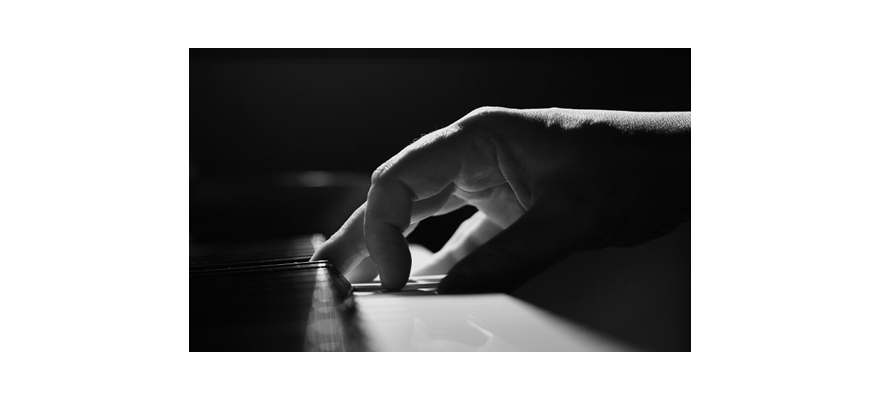Piano Blues - A Short Story
This short fiction piece by Echezonachukwu Nduka tells a young woman's story of slowly falling in love with the piano - and the unintended consequences. If you're a writer and would like to be featured on the ZODML blog, send a pitch to editorial@zodml.org. From my childhood days through my adolescence and time at university, I never attached any special importance to the piano. It never fascinated me. During my formative years in the convent where I had my secondary education, there was a Yamaha upright piano installed in the school auditorium which was often played by Mr James, a bald man in his mid-fifties who made piano-playing laughable and sometimes, mysterious. During morning assemblies, as soon as the morning hymn was announced, he would introduce the hymn and nod indifferently to the rhythm, moving his left foot sideways until it ended. Some of us would watch the man closely, abandoning the hymn, and, sometimes, laughing discreetly at intervals. He looked like a lunatic with a mental disorder that erupted at the sight of a piano, or at the strike of the first note.
Once, during the morning assembly, I was sitting in the middle row of the chapel with my friends and classmates, Yolanda and Jenny, when the opening hymn was announced. We all stood up, clutching our hymn books and turning the pages very fast, a sort of competition with no reward we instituted for ourselves to be the one who opened the announced hymn first. The piano music started. As if prompted by a remote control, we directed our gaze to Mr James. He seemed to be in high spirits that morning. His dramatic display was particularly intense that day, and I unconsciously let out a loud laugh. The principal, a no-nonsense and sophisticated lady in her early forties, caught sight of me and waved her left arm in the air. Immediately, everyone stopped singing. Mr James’s piano playing stopped too. As the principal directed her gaze towards me, my heart started pounding as if it would fall out of my chest. I knew I was in trouble. “Stella Anene!” “Yes Ma,” I answered and quietly put down my hymn book. “Come out here!” she ordered. I moseyed along the aisle of the chapel to the front amidst the murmurings of other students speculating about what doom I would face. “Why did you laugh?” she asked sternly. At that time, Mr James, the pianist, was directing his gaze at me, like everyone else. I looked down and put my two hands behind me, unsure of what to say. I knew I would face a severe punishment, no doubt. But my punishment would be multiplied if I said the actual reason why I laughed. I was not sure how Mr James would take an honest answer. Aside from being the school pianist, he was the teacher of one of the subjects I loathed: music. The principal maintained her stern look, silently waiting for my response. I didn’t utter a word. That act earned me the most dreaded punishment in school: I dug a pit for a whole week and cut the tall thick grasses behind the chemistry laboratory. On a certain Sunday, after the usual evening service, Yolanda and Jenny engaged me in a conversation I had little or no interest in. “Girls, I think the man’s problem is beyond music. I doubt if he does those things deliberately,” Jenny said. “Exactly! I feel the man has a loose nut in his head. You can’t swear that Mr James is one hundred percent sane, judging from his behaviour,” Yolanda said, sounding way too sure. “Hundred percent sane? No way! The man is mad. Madness comes in several kinds, you know. That one is his unique way of displaying his own,” Jenny quipped. “Hundred percent sane, really? Who on earth is a hundred percent sane? Don’t you know there’s an iota of madness in everyone? Wait – I don’t even know why you girls are arguing over nothing. Whether the man is sane or not, that’s his business. As for me, he can do whatever he likes on the piano. I don’t really care,” I said. “For real?” Yolanda asked. “Yes, for real.” Both of them held their peace. ** My coldness for piano music and pianists didn’t end after my graduation from the convent. As a psychology student at the university, I didn’t imagine that I would one day watch someone standing in front of the class talking about crotchets and quavers; I thought all that was gone with the troubles of the convent. But no – I was wrong. The introduction of music as one of the compulsory courses of study in the General Studies curriculum left me with no choice other than to attend the class or fail. A young lecturer, supposedly a first-class graduate who was retained by the university to lecture as a graduate assistant, was assigned to take the course. Julius, the young man, did not look older than twenty-two; he could be mistaken for a first or second-year student who had just gotten used to university life. The first class was at 2pm on an intensely sunny day. He strolled in casually, without lecturing materials, and mounted the podium. Clad in a black shirt neatly tucked into black chinos, we assumed he was one of the numerous student politicians who always moved around the General Study halls campaigning for a post in the student union government. None of the students would have believed that Julius, as smallish as he appeared, could be a lecturer, and in general studies of all places! As soon as he greeted us, some notorious students who normally stayed at the back of the hall started shouting: “Zuwo! Zuwo! Comot there abeg!” The hall was thrown into chaos as the majority of the students laughed at him, myself included. We wondered what would make a student abandon his studies, moving from hall to hall to address uninterested students, and in such hot weather. The chaos became even more intense and it took the efforts of older lecturers whose offices were close to the hall and some security personnel to douse the noise. But when the students learnt that Julius was a lecturer from the department of music, the hall became absolutely calm. Julius spoke very briefly about GS 206: Music as an Art and Science. After the brief introductory lecture, everyone was dumbfounded. Even those who were famous for asking unnecessary questions in general study lectures just to be noticed kept quiet. Not only did Julius teach fluently without bothering to consult any materials, his expression was superb. He sounded like a radio presenter; his accent was polished and his intelligence was clear. Most of the students, like me, were overwhelmed. It was very uncommon to meet lecturers who exuded such brilliance during lectures. Most of the general studies’ lecturers were old men and women who should have retired, but for unknown reasons remained in the university. But with Julius, there was a drastic response to lecture attendance. Some students who thought attending lectures was a waste of time soon changed their minds; during every music class, the hall was filled by both students registered for the course and those who had heard about Julius and wanted to see him for themselves. During the second class, he spoke about the uses of music and its efficacy in controlling emotions. He cited many examples, most of which were not strange to me. I knew that one could listen to cool R’n’B, soul or blues and get reflective, or get wild while listening to hip-hop or hard rock. He later talked about music therapy and the role of music in helping melancholic or depressed patients. That was when it became clear to me that the academicians who introduced music as part of the General Studies curriculum were no fools. As a psychologist, I needed to study and understand the appropriate use of music in my practice. I paid rapt attention as he went on, as usual unaided by any teaching materials. The lecture went on fine until Julius made a reference to the history of Western music. My heart skipped. Like a sudden flash of light, Mr James’s nodding head and waving foot flashed before my eyes. I remembered what he had taught us about Haydn, Mozart, and Beethoven and became uneasy. If this was what this course entailed too, then, I was bound to achieve an average mark. When Mr James taught the history of Western music, he had it made so uninteresting that I wondered why someone should waste time studying music as a course. At the end of that term, I had a D in music. But with Julius, the same talk about Haydn, Mozart and Beethoven became quite interesting. That day, I learnt about the likes of Schubert, Schumann, Mendelssohn, Chopin, Franz Lizst, and several other Romantic music composers. Mr James never bothered to tell us about other composers – but even if he did, it wouldn’t have ignited my interest. Julius took his time, linking the sudden change of moods in Beethoven’s piano music to the character of the composer. He also bragged about how he had performed several piano sonatas by Beethoven, and even used the composer’s work as a major exponent in his degree project performance. “How many of you play the piano?” Julius asked, raising his right hand and looking around, expecting anyone who played the piano to do same. No other hand was raised. “Wonderful!” he exclaimed, with surprise in his eyes. “Okay, how many of you are willing to learn?” Many hands waved in the air, anticipating his reply. He made a wry face, turned, and walked out of the lecture hall. “Stella!” a voice hailed me from amidst the crowd of students hurrying out of the lecture hall. I knew the voice belonged to Sandra, my course mate, so I waited for her to catch up. “Did you see what just happened in there? What was the meaning of that?” she asked. I knew she was referring to the manner in which Julius had ended the class, without giving further information to students who indicated interest. Sandra was one of those who had raised their hands in the lecture hall. She had sometimes talked about learning how to play the piano, but her schedules hadn’t been fair to her, she often claimed. “I don’t know,” I answered as we walked to our department. *** Shepherd’s Lamb Campus Fellowship was the most attended fellowship on campus. Every Thursday evening, students, and sometimes, lecturers, would be seen trooping into the Ake Building in great numbers. Sandra had claimed there was something special about the gathering. She didn’t belong to the fellowship, but she talked about it so much that one could easily assume she was one of the leaders, or at least an usher. Once, she visited my room and went on and on about how the student pastor of the fellowship could have won the Mr Campus contest if he had contested: how he was tall, muscular, handsome, and brilliant, and had an appealing look in his eyes. How one day, he was rumoured to have been seen drinking Heineken Beer and dancing in a club with a lady identified as the choir leader of the fellowship. How his fellowship members quickly claimed that the rumour was false, insisting that their pastor could not engage in such an awful immoral practice. “Are you a lamb?” Janet, my roommate, asked in a suggestive manner. Janet was a staunch member of the fellowship, never missing a session for any reason. She often came back to our room singing and holding her big King James Bible close to her chest. Once, she had deliberately missed a test so that she could attend a special prayer session during which their pastor spoke in tongues, prophesied, and performed miracles. When I asked why she acted the way she did, all she said was, “God will handle it.” “God will handle it,” I repeated, and shut the door after me. The words felt dry in my mouth. “No, I’m not a lamb,” Sandra answered, chewing her gum provocatively. “And who are the lambs?” “Oh! You don’t even know, and here you are, saying things that do not concern you. Lambs are our fellowship members. Once you’re a registered member, you become known as a lamb. The shepherd’s lamb.” Immediately, my eyes met Sandra’s and we laughed out loud. Janet looked at us, shook her head, and returned to her magazine. To Sandra and me, it was ridiculous that a group of people could be addressed as “lambs” for the sake of religion. Later, Janet told me about a certain young lecturer from the department of music who played the keyboard in their fellowship. She talked about how good he was and how other keyboardists were left with no option than to sit and learn from him. “Is his name Julius?” I asked. “Yes! How did you know?” “Never mind. It’s not important.” Although I never felt there was anything fascinating about the piano, I needed to see things for myself. So one Thursday evening as Janet was preparing to leave for fellowship, I took my Bible and followed her. At the end of the session, the members were chattering and exchanging pleasantries. I quickly walked up to Julius. “Good evening, Mr Julius.” “Good evening, sister. How do you do?” “How do you do,” I replied. “I’m Stella Anene, a 200 level student of psychology. I take your General Studies course.” “Oh! How are you getting on with it?” “Very well, sir.” It was my second time getting close to him outside the lecture hall. The first attempt was when I followed my class representative to his office to submit a class assignment. He asked if I was a class representative too and when I said no, he asked me to leave his office immediately. That act almost ruined my day. I thought he was too principled, too harsh. But I still liked him. After I complimented him on how good he was on the piano, Mr Julius gave me a smile that suggested he heard such compliments every day. He was full of himself, I knew. As we strolled out of the building, he narrated how he started playing the piano at a very tender age. How his parents bought him the instrument, supported and encouraged him to start. How he finally chose to study music and become a professional pianist. All the while, I kept on nodding, as if I was there when all of these things had happened. “But you know, Nigeria is not a very appreciative environment for my kind of piano music, but we will keep on practicing and playing,” he said and shrugged. I was not sure how to respond and remained silent. I wanted to tell him that before I watched his performance, I had assumed that playing the piano was unattractive, considering how Mr James played during my days in the convent. But I didn’t utter a word. “Do you know any notable female pianists?” he asked. “No.” “Oh – well, there are lots of them who are quite good. You can search on Google to read about them or watch their performances on YouTube. It’ll definitely change your perception about playing the piano. I tell you, it’s an awesome practice. If those ladies can play the piano, you can too – and even better.” I thanked him and we parted ways. That night, I quickly booted my laptop and began to search for those ladies who were master pianists, those ladies who had made love and bonded with crotchets and quavers, those ladies who could do what I thought was for men only, those ladies who had performed on world stages. The page loaded and there they were: Adolovni Acosta, a Philippines-born classical pianist noted for her distinct touch and virtuosity. Ambre Hammond, an Australian pianist, taught to play the piano by her mother Carolyn Hammond from the age of three; she gave her first concert at the age of five and has since become an accomplished concert pianist. Anastasia Rizikov, a fifteen year-old Canadian pianist who has won several awards and performed on stages around the world. There were lots of them. As I watched their performances on YouTube, Mr Julius’s words kept echoing in my head: “If those ladies could play the piano, you can too – and even better.” That same night, I decided to learn and play like those ladies. If there were going to be only five notable female pianists in Nigeria, I was going to be one of them. *** I was apprehensive when Mr Julius suggested that I visit his private apartment every Tuesday evening for my piano lessons. I had no issues with his asking me to purchase a keyboard, buy a piano tutor booklet he recommended, and practise on my own after each class. But the idea of having the lesson in his house worried me. I did not trust people so much, especially those who readily gave the impression of being overly religious. I had objected politely, suggesting other possible venues for the lessons, but he convinced me, pointing out that he owned an upright electronic piano with foot pedals which he claimed to be the most appropriate instrument for beginners. He lived alone, he told me, and that made me even more worried. What if, somehow, in the course of our study, the devil’s tune found his way into his heart and he did the unimaginable? I nursed this fear in my heart, attending the classes with my tutor booklet and paying rapt attention to his instructions as I watched him demonstrate some technically difficult sections. But the piano lessons continued smoothly. I soon successfully passed the preparatory lesson stage, played lessons one to five, and was about to enter the second level. One Tuesday, I finished with my lectures at exactly 4pm and rushed off to Mr Julius’s apartment with my lesson materials, determined to move on to the next level. He had assured me that he would be in his house that evening, and that although it was his birthday, he would celebrate the next day. I entered the compound and closed the gate behind me, but stood there perplexed for a while. Loud hip-hop music was banging loudly from the stereo in his living room, something I found strange as he had once argued that Nigerian pop musicians who played dancehall beats were extremely vulgar and paid little or no attention to lyrical content. He said he would never sit and listen to that kind of music, let alone pay for it and have it play in his car or apartment. “I’m an academic musician,” he often said. I stood there for a while, hugging myself and fighting an internal battle. I knew he knew I would be there at that time. I rang the doorbell several times before the door opened. “Good evening, sir”. “Good evening, come in,” he said, holding a glass of wine and nodding to the music. I walked in gently, still flabbergasted. There was no point asking why he chose to play the music so loudly, why he was drinking, why he had chosen to turn his living room into a club of some sort. Those questions could land me in trouble. On the centre table, a half-finished bottle of brandy stood directly under the ceiling fan. I needed no one to tell me that the possibility of having my piano lesson was very slim. “I shouldn’t have come in here,” I thought. “So, you decided to celebrate your birthday today, huh?” I asked. “Not really – I just wanted to be in a mood I’ve never been in lately. Let’s call this a pre-birthday party. I’ll get you something to drink, my dear.” “Not to worry, I’m fine. You know why I’m here,” I said politely. He insisted. He entered his room and came out with a packet of Chivita juice and a glass. He shook it and poured some out for me. After handing it to me, he grabbed his glass. “Cheers,” he said and drank. I drank too. I sat on the sofa cross-legged and watched him dance. After few minutes, I became giddy and passed out. Some hours later, I regained consciousness. I was on a bed without my clothes on, and with a painful feeling between my thighs. My bra and underpants were on the floor. I found my blouse and skirt on the sofa I sat on when Mr. Julius was drinking and dancing. He was not there. He had left with my pride of womanhood. I dressed up, took my piano lesson materials, and left. I left the piano too. Image source






